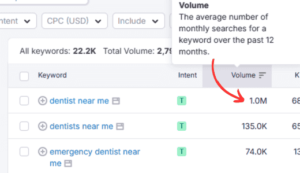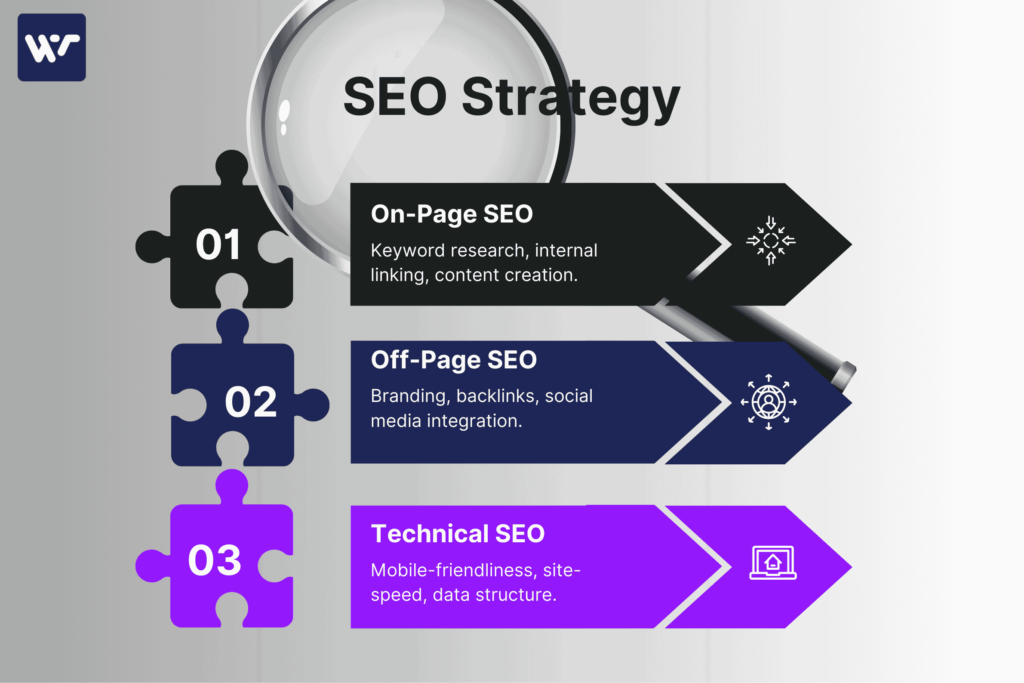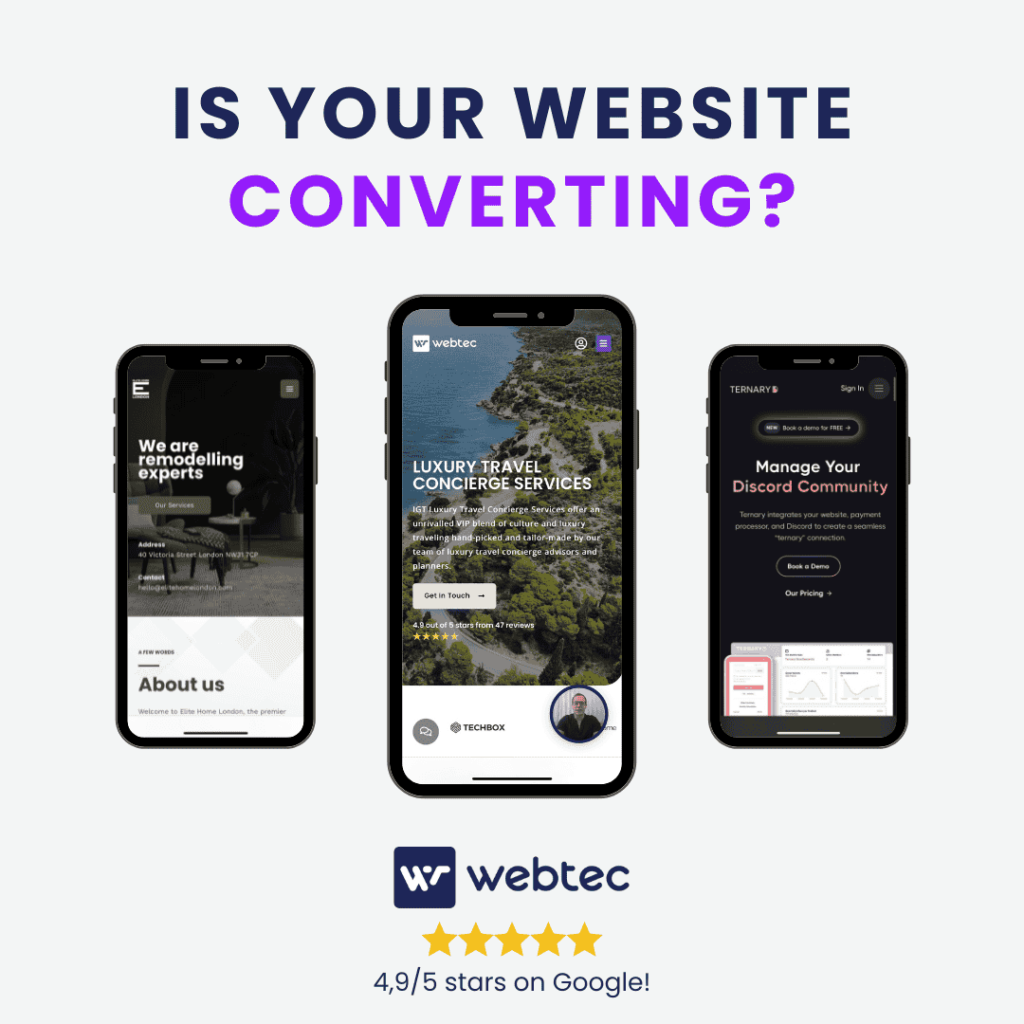Healthcare doesn’t really need PR. Everyone knows that when you are sick or have a health condition, you should contact a medical professional. So, the real question is, why should you be the one they contact?
Today’s focus is on Search Engine Optimization (SEO) for dentists. To have a successful dental practice, you need to have enough patients who have benefited from your services and can give a good review.
It’s true that your good work and referrals can get you more patients, but in this digital age, more people rely on the internet for information. That’s why there’s an increased need for SEO services for dentists.
With a search engine optimized website, you get more views, with more views come more clicks, and more clicks mean more patients. In this piece, we’ll be exploring SEO for dentists in-depth, covering its importance, effective strategies, and the best way to go about it.
Importance of SEO for Dentists
To begin, it would interest you to know that there are about one million Google searches in the U.S. for the phrase “dentist near me” every month.

Just imagine if your dental practice was among the first 3 that Google showed those one million potential patients. Your mouth’s probably already watering right now, so let’s look at the benefits of SEO for dentists.
- Increased Online Visibility
People hardly ever go beyond the first Google page result, especially when they get their prompts right. The best way to get noticed is to be among those top results that show on the first page, and that’s what SEO offers.
With dental SEO, your website can get ranked at the top of popular searches such as “Dentists near me” or “Where to get braces.” This positions you among the most common choices for online researchers and potential patients.
- Cost-Effective Local Acquisition
This is not to say that SEO will not cost you time and even money, but among the common advertising methods, it has one of the highest long-term benefits. When you utilize SEO services for dentists, you prepare your website to receive all inquisitive online guests.
This means that you will directly target those interested in dental services, especially in your local community. This surpasses just putting up a paid advert or cold email, hoping the viewer or receiver requires your service. Yo,u in turn get a significantly higher return on investment and conversion rate.
- Enhanced Credibility
Quick tip: Many patients don’t know how SEO works, and many more don’t care when they are in need of dental services. This means that once your website ranks highly, you have already gained so much credibility in their sight.
All that is left for you to do is to make sure your content is appealing and delivers when they actually click on it. With credibility comes trust, and patients want to trust their dentists.
- Overtaking the Competition
Healthcare itself is not a competitive niche, but everyone wants their practice to be the go-to for their services. When you and other dental practices offer similar services at similar rates and times, you can make up the difference with SEO for dentists. Since they are so similar, chances are patients will go for the first one they see.
How Does SEO Work?

We’ll try not to get too technical but make you understand what goes on under the hood with your web page or content online.
Think of search engines like Google as incredibly sophisticated librarians for the entire internet. Their job is to find, understand, and organize the vast amount of online information to provide users with the most relevant and helpful answers to their search queries. Here’s how they do it:
- Web Crawling
Firstly, Google needs to know what every website is about before it can know which one to show you when you ask a question. The process to do this is called web crawling.
Search engines use these automated programs called “crawlers” or “spiders” to visit your website to see what’s there. They read the content, follow the links, and add this information to Google’s index.
- Indexing
Once a crawler finds a page, it needs to make sense of what it found. This is where indexing comes in. Your website is analyzed for content, images, and other elements. It does this to note things like:
- The topic
- The keywords
- The content structure
- The quality of your information
- The pages being linked to
This information is then stored in Google’s index, ready to be retrieved when someone searches for relevant terms.
- Search Engine Ranking
Now, for the main event. With the index database, a Google algorithm of broad, largely unexplained factors helps determine the ranking of websites for every search. The popular algorithm includes criteria such as:
- Relevance of content to the search query
- Quality of content
- Proximity to user
- Recency of the content
- Backlinks (More on this later)
There are so many more factors involved, and knowing and utilizing them is what gives most SEO agencies their job title.
- Algorithm Updates
You might be thinking, if Google has been doing this for so long, why don’t people know all the ranking factors by now? Well, that’s because Google regularly updates them.
These regular updates are what keep everyone on their toes. You can have a solid strategy on SEO for dentists in 2022 that got you a first-page ranking, but that will probably no longer hold water today. Think of these updates as regular check-ups for your online presence – just like you recommend to your patients for their dental health!
How to Do Dental SEO

Now let’s get into what an SEO agency really does when they want to revamp your webpage. There are so many things that encompass SEO, but we’ll be spilling the tea on those that take top spots in each category.
If you are able to create a setup that covers these listings below, then you would have also touched on so many other aspects without knowing. Grab a notepad because we will be using some SEO terms, but not to worry, we’ll explain them:
- Keyword Research for Dental Websites
You can’t talk about SEO without talking about keywords. We like to think of keywords as the basic unit of SEO. Keywords involve the precise words, terms, or phrases that are being searched for each time.
This means SEO is concerned with finding out what your potential patients are searching for and how they are searching for it, then making it easy for you to create content that will lead them to you.
Let’s look at an example: Imagine your potential patients are searching with queries like “Where can I get braces near me?” “Can I use an Invisalign?” “How much do braces cost?” But your webpage is filled with the keywords “Orthodontic treatments in New Jersey” or “Dental alignment expert.” There is a mismatch, and Google is unlikely to link you to those queries we listed.
This simple analogy is why you will need to do keyword research. This will involve looking into:
- What services do you offer
- What your competitors are doing
- What most of your potential clients are searching for
- What is trending
This can be an exhaustive process, but you’re in luck. There are tools to help. Tools like Google keyword planner, Moz keyword explorer, SEMrush Keyword Magic Tool, and Ubersuggest. There are also SEO agencies like Webtec to help you utilize these tools so you don’t have to learn them.
As a parting gift from this section, here are some high-value keywords in SEO for dentists:
- “Dentist near me”
- “Emergency dentist”
- “Teeth whitening”
- “Dental implants cost”
- “Pediatric dentist”
- “Best cosmetic dentistry”
Remember that you still have to personalize these keywords further using your services and location. You will also need to find out the best-supporting keywords that go with the ones you choose.
- On-Page SEO
On-page SEO involves optimizing the content on your website to improve your chances of being ranked higher on Google’s Search Engine Results Pages (SERPs) by using targeted keywords and top SEO strategies. It involves creating keyword-driven pages.
This is the most important aspect of online visibility and the major reason why we do keyword research. Once you know what your potential patients are looking for, you have to become it. This involves many well-known SEO practices commonly but not appropriately used, such as:
- Structuring the contents of the pages into headings, paragraphs, and lists
- Adding meta titles and meta descriptions to each webpage
- Inserting keywords in various headers, titles, and strategic parts of the pages
- Creating keyword-targeted and informative blog content housed on the website
- Adding useful images with keyword-infused alt texts
- Putting contact details and the location of the business
- Answering frequently asked questions on the page
- Making a mobile-friendly webpage
- Optimizing the user experience of the website
- Updating content often to keep things fresh
These are the core of on-page SEO, but there’s so much more. Some tools can assist with this aspect. Yoast SEO and Rank Math are very useful for WordPress websites, and content-making and editing tools like Grammarly and Canva also assist with the content to be created.
- Link Building Techniques: An Off-page SEO Practice
If there’s on-page, then of course there’s off-page. One very effective off-page SEO strategy is link building. Link building involves securing hyperlinks from reputable websites to your own. Hyperlinks, if you didn’t know, are simply links that direct you to other locations. When they come from other websites to yours, they are referred to as backlinks.
Backlinks are very strong ranking factors. If you remember what we said about crawlers going into your site and connecting around the internet, they do so with links. The more backlinks you have, the more credible you are to the crawlers.
Getting backlinks requires patience and hard work. Here are some effective link-building strategies for dentists:
- Create Linkable Content: The patient game usually begins with putting up relevant dental content on your website. This can be dental tips, informative blog posts, comprehensive guides, research, and Infographics explaining common dental issues. It may take time, but good content attracts links.
- Guest Blogging: Offering to write guest posts for dental publications, health websites, or any high-quality website that will include backlinks to yours is another good strategy. This should be done with care, and your content should offer value. It is seen as a win-win for both websites involved.
- Broken Link Building: Sometimes all you have to do is find links on other websites that are broken (i.e., deleted, outdated, or irrelevant). If you can offer better resources than the ones linked, you have a chance of being accepted.
- Local Partnerships: Get involved with the local community and businesses around you. By sponsoring health events (either by donations or free dental sessions) or partnering with local health businesses (e.g., orthodontists, oral surgeons, etc.). This way, you are opportune to be referenced and linked to online.
- Directories Inclusions: Get added to online dental or healthcare directories or resource pages that relate to dental health. This also increases credibility and offers backlinks.
It’s important to note that not all backlinks have the same value. One high-quality link from a reputable dental association or healthcare website is worth more than dozens of links from irrelevant or low-quality sites. Work on getting relevant backlinks and avoid practices such as buying links or spamming, as Google has strict penalties against those.
- Local SEO for Dentists
Local SEO is a subset of SEO that is more location-specific. Remember that “dentist near me” search stat? Local SEO is how you show up for those searches, often appearing in the “Map Pack” (the map listing with 3 local businesses prominently displayed at the top of search results).
Think about it, there are worldwide-renowned dental practices that have a large SEO budget, and you will find it difficult to overtake them, but if you increase your visibility in local searches, they can’t steal the customers near you.
A 2013 study among 5,000 U.S. adults showed that 78% of local mobile searches resulted in offline purchases within 12 months. This shows the power of standing out locally. For healthcare, SEO for dentists works way more. A patient will already trust your services just because you rank highly.
Here are tips on optimizing your local SEO strategies:
- Consistent Online Identity: In all your online activities, maintain a consistent Name, Address, and Phone number (NAP). This is to ensure Google recognizes your identity across the board.
- Google Business Profile (GBP): Set up and complete your GBP with accurate and precise information. This increases local search rankings and visibility in Google Search and Google Maps.
- Location-Specific Keywords: Mention your city, neighborhood, and service area frequently and naturally within your website content. Some strategic examples include “Dentist in [City Name],” “Dental Implants [City Name],” and “[Neighborhood] Dental Office.”
- Encourage Reviews: Actively request reviews from happy patients. Respond professionally to all reviews (positive and negative). Reviews are a huge local ranking factor.
By focusing on these local SEO strategies, you can ensure that your dental practice appears when potential patients in your area are searching for dental services.
- Monitoring SEO Data
SEO isn’t a “set it and forget it” task, at least Google has assured that. Even if algorithms weren’t ever-changing, your competitors would be working on making better content day in, day out. For this reason, you need to monitor how you are doing.
Tracking data and monitoring changes allows you to recognize where improvements can come in. There are powerful tools online that can be used to monitor different aspects of SEO (keyword tracking, site audit, backlink auditing, competitor analysis, conversion rates, etc.). Some of them include Google Analytics, Google Search Console, and SEO tools like SEMrush, Ahrefs, and Moz Pro.
To make use of some of these tools, you will need to know some SEO terms and abbreviations. Here are a few to get you started:
- Keyword Difficulty (KD): This metric indicates how hard it is to rank for selected keywords. A high KD means more competition.
- Domain Rating/Authority (DR/DA): A score developed by Ahrefs that shows the strength of a website’s backlink profile. You tend to have higher rankings if your DR is high.
- Search Volume (SV): The average number of monthly searches for a specific keyword. Higher SV means more chances of getting patients.
- Click-Through Rate (CTR): The percentage of people who click on your listing after seeing it in search results. If you offer value, you would get a high CTR.
- Bounce Rate: The percentage of visitors who leave your site after viewing only one page. You should aim for low bounce rates.
- Dwell Time: How long visitors stay on your site after clicking through from search results. Longer dwell time suggests valuable content.
A better understanding of these terms and how to use them to your benefit will show you the true power of SEO for dentists. Regularly reviewing this data helps you refine your keyword strategy, identify content gaps, find new link-building opportunities, and fix technical problems.
Hire an SEO Agency for Dentists
You may be feeling overwhelmed by what you’ve read so far, or you may be up for the challenge. Either way, there is an easier solution. You could just hire someone to do this for you. By this, we mean everything: keyword research, on-page SEO, off-page SEO, and local SEO. There are SEO agencies dedicated to doing this for businesses.
Not everyone likes to pay for things they could do themselves, but as a dentist, you already have things on your plate; adding SEO for dentists just makes things a little more hectic.
Hiring an SEO agency for your dental practice will relieve you of online marketing activities and shoot you beyond your competitors. If you are starting to fall in line with this then look no further, cause Webtec is here!
Why Webtec?

Webtec is a web design and SEO service agency. This means we not only carry out SEO services but also help in building websites from scratch (Just imagine the SEO opportunities of our new sites).
We have recorded multiple successes in providing SEO services for small businesses, middle-range firms, and even large organizations. Some firms have an SEO focus, it could be only on-page SEO, link building, or just keyword incorporation. Webtec does it all and more at affordable prices that you can’t find anywhere else.
To secure our cost-effective SEO services for dentists, contact us to book a consultation session where we look into your website, tell you what works, what doesn’t, what we can do to make it better, and if you also need website redesign services.
Here’s a Quick Summary
SEO for dentists is essential for every practicing dentist with a website or looking to have one. It will help you build visibility, credibility, and a strong competitive edge both locally and globally.
Effective dental SEO involves Keyword Research, On-Page Optimization (content & technical), Local SEO (especially Google Business Profile), quality Link Building, and ongoing Data Monitoring.
These can all be done by you or your employees, but it takes time, patience, and expertise. SEO agencies for dentists are available to ease the process. Webtec is a cost-effective solution for crafting stunning websites and implementing powerful SEO strategies specifically for dentists. We help practices like yours get found, get clicked, and get more patients through the door.
With the right motivation and assistance, you are one step away from ranking high on Google’s SERPs for relevant dental keywords!



